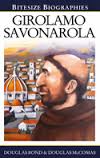
Girolamo Savonarola was born in Ferrara, Italy, in 1452. It was the year Leonardo daVinci was born. Across Europe, it was a time of development and change: Gutenburg's Bible came off the press two years later, Luther would be born when Savonarola was 31. Botticelli was at work, a Medici ruled Florence and as Columbus reached the New World Savonarola began to preach. His congregations would later number up to 12,000 as people came to hear expository preaching not in Latin but in the Florentine Italian current in Tuscany. 'His message was more like that of the Hebrew prophets: a declaration of the holiness of God, a decrying of rebellion against God's will and ways, the promise of judgment at the hands of an angry God, concluding with an earnest appeal to repentance.' Savonarola was a Roman Catholic monk: how does his biography earn a place in this series? The authors explain: [Here is] Savonarola's description of saving love: 'This love is likewise a gift of the Lord; it is a fire that kindleth all dry things, and whoever is disposed unto it shall forthwith find it descend into his heart and set it aflame.' When a man calls salvation 'a gift of the Lord,' he cannot be quite so far away from the justification by faith alone preached by Reformers in the next generation. To be sure, Savonarola had a great deal to say about law and good works. But he was clear that 'Nothing can be done save by the impulse of love. Love easily and sweetly fulfilleth the whole law of God.' And where did this love come from? Savonarola's preaching was brimful with the source: the love of Jesus.



